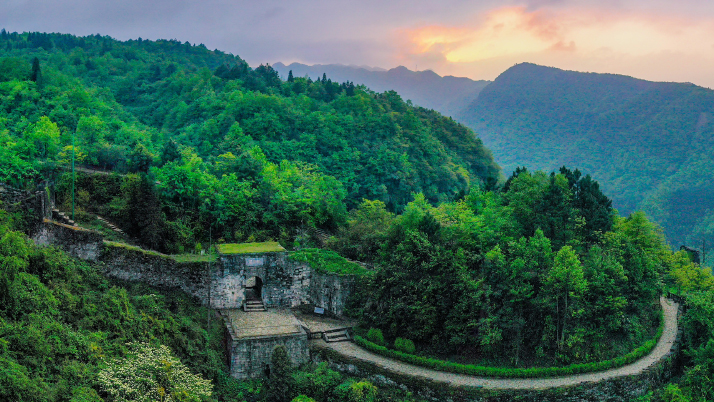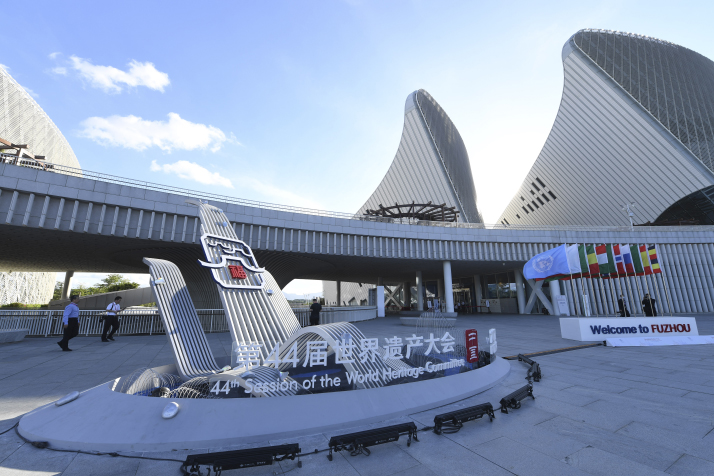| China |
| Preserving world heritage will involve increased effort and more international cooperation | |
|
|
 Hailongtun Fortress, a World Heritage site dating back more than 800 years in Zunyi, Guizhou Province, on April 22 (XINHUA)
The 44th Session of the World Heritage Committee of the UN Educational, Scientific and Cultural Organization (UNESCO) opened in Fuzhou, capital of China's coastal province of Fujian, on July 16, after having been postponed for a year due to the coronavirus pandemic. It was the first time the conference had been halted since the first session took place in 1977. The extended event, scheduled to conclude on July 31, combines online and offline events and will cover the agendas of both the 2020 and 2021 meetings. This is the second time a Chinese city has hosted the meeting since China joined the Convention Concerning the Protection of the World Cultural and Natural Heritage in 1985. Chinese President Xi Jinping said in a congratulatory letter that to protect, inherit and make good use of the world's precious treasures "is our shared responsibility, and is of vital importance to the continuity of human civilization and the sustainable development of the world." Xi said China is willing to work with UNESCO and other countries across the globe to strengthen exchanges and cooperation, promote dialogue and mutual learning, support the cause of world heritage protection, jointly safeguard the cultural and natural treasures of humanity, and promote the building of a community with a shared future for humanity. China is now home to 55 UNESCO World Heritage sites, tying for first place with Italy. This year, China recommends Quanzhou, a port city in Fujian and a global maritime trade center in ancient China, for World Heritage site status consideration.  The 44th Session of the UNESCO World Heritage Committee takes place in Fuzhou, Fujian Province, on July 16 (XINHUA)
Call to action Audrey Azoulay, Director General of UNESCO, considers the session a return to some form of normalcy for World Heritage sites as the world still faces uncertainty and challenges due to the pandemic. She said the income from tourism of many sites was approximately halved in 2020, and called on people in the tourism industry to pay more attention to their value and help local residents. A series of activities and side events are held during the session, pooling the ideas and wisdom of the participants, and putting forward new proposals and initiatives to address future challenges. The session will review over 40 candidates for entry to the UNESCO World Heritage List. It will also examine the state of conservation of sites already inscribed on the list and make important updates based on their conditions. Liverpool, a city in the United Kingdom, which was placed on the List of World Heritage in Danger in 2012, was proposed for removal from the World Heritage List as a Maritime Mercantile City because "its outstanding universal value is no longer present." The additions of the Italian city of Venice and its lagoon, and the Kathmandu Valley in Nepal to the List of World Heritage in Danger were also discussed. UNESCO's Priority Africa strategy is another focus of the session. Among a total of 1,121 sites on the World Heritage List, only 96, less than 9 percent, are in Africa. Tian Xuejun, Chinese Vice Minister of Education and Director of the Chinese National Commission for UNESCO, said it is of global significance to make the distribution of World Heritage sites more balanced. Salonga National Park, which is located in the Democratic Republic of the Congo and is Africa's largest tropical rainforest reserve, was added to the World Heritage List in 1984 and to the List of World Heritage in Danger in 1999. The park was removed from the latter during this session as anti-poaching measures have led to bonobo chimp populations remaining stable in the park and the forest elephant population has also begun to slowly recover. A joint statement, known as the Fuzhou Declaration, was adopted on July 18. Members of the World Heritage Committee call for closer international cooperation on World Heritage site protection and increasing support for developing countries, especially those in Africa and small island developing states. The document states that global heritage has made a positive contribution to the promotion of exchanges and mutual learning among civilizations, as well as to world peace and sustainable development. It also urges for the wider participation of academics, civil society and communities to significantly strengthen links between heritage conservation and social and economic development activities, with the aim to protect World Heritage sites for the benefits of all in line with the 2015 World Heritage Sustainable Development Policy.  The venue of the opening ceremony of the 44th Session of the UNESCO World Heritage Committee in Fuzhou (XINHUA)
Protection underway "China has made great efforts in preserving World Heritage sites," Tian said at a press conference on July 5. "The endeavor has become a national strategy and China has established a legal system for this purpose." Such efforts will be further enhanced as part of China's rural vitalization strategy as many of the sites are located in remote areas and will play a positive role in promoting tourism. On July 10, a major renovation project was launched on Kulangsu, an island in Xiamen, another port city in Fujian that was added to the World Heritage List in July 2017. The renovation is the latest in a series of measures the local government is taking to protect the island and preserve its places of historical and cultural significance. In 2013, the Xiamen City Government rolled out measures including limiting the number of tourists, promoting garbage sorting, restoring buildings and standardizing business operations on Kulangsu. A year later, the plan for an island-wide museum was launched, with dilapidated houses, hospitals and other historical sites being restored as a means of telling the island's stories. In the following years, additional mechanisms for heritage site protection were introduced, as well as policies aimed at promoting the island's sustainable development. Such efforts are essential to China's heritage preservation strategy. As the World Heritage Outlook 2020 shows, China's protection of World Heritage sites is significantly above average. Its achievements have won applause from the international community. Tian said China has built an effective mechanism for the protection of World Heritage sites and strengthened international cooperation. At the opening ceremony of the session, the Chinese Government announced that it would provide 100 scholarships in the following five years for students from other developing countries—particularly African nations and small island states—to nurture expertise in the conservation and management of World Heritage sites. Moreover, a new education platform will be jointly set up by China and UNESCO for training professionals in World Heritage site conservation, according to Tian. Mechtild Rossler, Director of the UNESCO World Heritage Center, described China as "a major actor" in the international scene to help countries and sites in need as many of the World Heritage sites are in imminent danger. In 2015, China helped Nepal restore the nine-story Basantapur temple complex in the Kathmandu Durbar Square, a UNESCO World Heritage site that was badly damaged in the massive earthquake in April that year. Also in 2015, China provided hi-tech solutions for the protection of Cambodia's Angkor Wat, the magnificent temple of the Khmer Empire, which faces inundation by tourists and environmental dangers. China helped by using remote sensing to collect and process images of the Angkor site in real time, instantly observing and analyzing the effects of natural disasters. China also helped Cambodia's Authority for the Protection and Management of Angkor and the Region of Siem Reap to build a ground station to receive and use Chinese satellite data. Through hosting international workshops, China has also provided technical training for managers and researchers of World Heritage sites from 12 developing countries in Asia and Africa. Long Ponnasirivath, Secretary of State and spokesperson for the Cambodian Ministry of Culture and Fine Arts, said at the session that China has taken strong measures to protect World Heritage sites, gaining recognition internationally and Cambodia wishes to draw more experience from China in this field. (Print Edition Title: Listing On) Copyedited by G.P. Wilson Comments to yuanyuan@bjreview.com |
|
||||||||||||||||||||||||||||
|